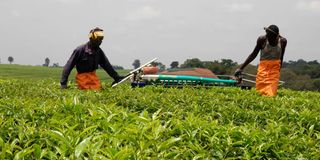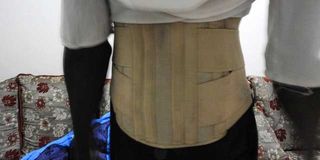Endless pain of operating tea-plucking machines

Workers with a mechanised tea-plucking machine in an estate on March 10. The machines were expected to increase profits for the companies.
A few years shy of 40, Nelson* walks weakly with a thick orthopaedic belt.
He tightens the cream fabric with a velcro tape to ease the back pain that resulted from nearly 10 years of pulling tea-harvesting machines, commonly known as MH.
Nelson has been working for Unilever, now Ekaterra, since 2004.
“We used to pick tea with our hands, which was easy. After the machines were introduced in 2007, things went wrong. Our health was compromised,” he said.
Many workers have suffered in silence as they fear losing their jobs should they complain to the management or the Kenya Plantation and Agricultural Workers Union (KPAWU), whose Secretary General Francis Atwoli doubles up as the Central Organisation and Trade Unions (Cotu) chief.
For nearly a decade, Nelson has been chaining the machine around his waist from one end as a colleague does the same from the other. On uneven terrain, they push the vibrating 12kg petrol-powered device on top of tea bushes.
By the time the bag attached to the machine is full, it will be around 60 kilos, ready for emptying and delivery to the collection point.
The cycle continues with intermittent stops to fuel or fix a hitch, from 6 am to 5 pm five days a week.
Workers at Unilever Tea Kenya Ltd Central Hospital prescribed a drug in December 2017, which US-based nurse Florence Rotich says is meant for people with nerve problems.
No libido
Nelson says his libido is almost dead and not even the constant physiotherapy has restored it.
The father of three wants more children, but simply cannot attain that.
We interviewed 20 pickers working on Ekaterra and James Finlay plantations. All have a form of musculoskeletal injury, which doctors say, results from carrying heavy loads and assuming a stooping posture for hours daily.
“Almost half of the men here have this belt. It’s become a common attire. For those with severe pain like me, we wear it even outside work, despite the discomfort,” said Peter, another tea picker.

This is how a waist belt is won by workers in the tea estates who have developed back, spinal and muscle injuries while operating mechanical green leaves plucking machines.
A former doctor at Central Hospital described the situation as disastrous and pitiable.
“If the case filed in the UK favours them, it could save many employees, mostly men,” he said.
Joel*, a worker at Ekaterra, said he has pleaded to be given lighter duties to no avail.
“I have used this belt for three years with the full knowledge of my supervisors. Despite medical reports, they have declined to allocate me lighter duties,” Joel said.
So bad is the situation that some injured workers have filed a case against James Finlay in Scotland.
The 1,300 employees accuse the company of forcing them to work for 12 hours in estates spread across Kericho and Bomet counties.
What was meant to improve productivity and profits for the companies has become a nightmare due to the rows between workers resisting the gadgets and managers insisting on mechanisation.
Bribe for jobs
There is a scramble for lighter duties such as tending to nurseries, weeding and general cleaning. Some workers bribe to get the jobs.
The companies had phased out hand-picking of tea by 2020. Workers now use shears, one-man machines or motorised harvesters.
The scarcity of opportunities has escalated the sex-for-jobs problem.
KPAWU Kericho Branch Secretary-General, Dickson Sang, said injured workers are targeted for dismissal.
“It is a very serious matter in the tea industry,” Mr Sang said.
At Ekaterra and James Finlay, a mechanised machine is assigned to four workers, who are expected to pick up to 1,000kgs of leaf daily.
They pick two amongst themselves to drive the machine as the others ferry the harvest to weighing centres. Payment for a kilo of green leaf is Sh2 to Sh4.
“The amount of harvest is affected by weather patterns. You can’t get a tonne during dry seasons but managers still push us. It is very strenuous,” said Leonard*, a worker.
So tough is the job that some have resorted to using drugs to enhance performance.
At Chagaik estate, a woman in her 50s pushes the machine “in the interest of gender balance”.
“The muscle aches at night drive away any sleep, yet asking for lighter duties is not an option. You have to be prepared to part with up to Sh5,000. It’s worse for women as male supervisors demand payment in kind,” she said.
"Miserable life"
Having picked tea for 25 years, Alice Chemeli was forced to retire to a miserable life in Mau Summit, where even cooking is daunting. She suffers chest, joint and back pain and stiff wrists.
“I was hired in 1992 but started developing problems with my chest and waist in 2010. I developed severe back pain in 2015. Even sitting was an excruciating experience and standing up from that seat was a bigger struggle,” Ms Chemeli said.
A doctor recommended that she be placed on “restricted work”, weeks before Chemeli left Unilever.
Dr Roy Otieno Ochieng, an occupational therapist, says a heavy load can cause sprains on muscles and joints.
“Such injuries have led to low performance among workers. Cases of low or no sexual urge have been reported, leading to the breaking of families,” Dr Ochieng said.
Workers interviewed said those who develop injuries on duty are only allowed to seek medical attention at Central Hospital.
Nelson had documents from Central Hospital, saying he “has a habit of visiting hospitals outside”. Because of that, Nelson’s supervisor wrote him a “show cause” letter.
“They never give us medical records. Whenever they refer us to Aga Khan or bigger hospitals, they seize the records when we return,” he said.
Ekaterra told the Sunday Nation that the employees are treated by certified health workers when they fall sick.
“We have elaborate safety and health programmes. In addition to carrying out safety risk assessments, our employees undergo annual occupational health examinations at government-accredited hospitals,” the company said in its statement.
It denied targeting particular employees for dismissal.
“We operate within the provisions of the Collective Bargaining Agreement, HR policies and employment laws of Kenya. Dismissal is as per the laid down procedures,” it said.
A task force on challenges in the sector formed by Kericho Governor Erick Mutai and chaired by Mr Richard Too recommended that the companies embrace a ratio of 60 per cent machine-plucking and 40 per cent by hand.
James Finlay said the safety and welfare of everyone connected with its business is always a priority.
“Free medical care is available to all, along with welfare support on a range of social issues. James Finlay has robust policies to protect the rights of workers,” it said.
The multinational admitted that a case had been filed against it by former workers in the UK.
“We are defending the litigation in Scottish courts. James Finlay’s business operates solely in Kenya and we respect the constitutional sovereignty of the Kenyan courts. We believe the proper place to address allegations brought by Kenyans regarding their employment in Kenya is in Kenyan Courts,” It said.






